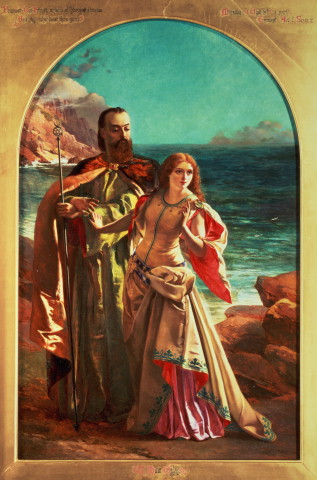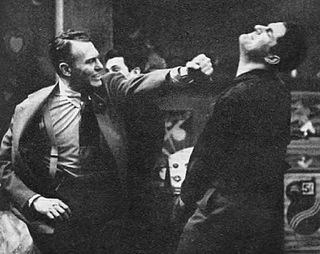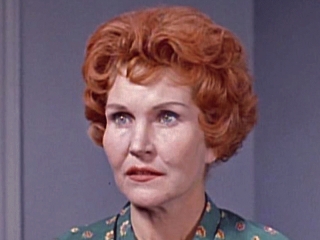Related Research Articles

Radio drama is a dramatized, purely acoustic performance. With no visual component, radio drama depends on dialogue, music and sound effects to help the listener imagine the characters and story: "It is auditory in the physical dimension but equally powerful as a visual force in the psychological dimension." Radio drama includes plays specifically written for radio, docudrama, dramatized works of fiction, as well as plays originally written for the theatre, including musical theatre, and opera.

Prospero is a fictional character and the protagonist of William Shakespeare's The Tempest.
The year 1953 in television involved some significant events. Below is a list of television-related events during 1953.
A television pilot in United Kingdom and United States television, is a standalone episode of a television series that is used to sell a show to a television network or other distributor. A pilot is created to be a testing ground to gauge whether a series will be successful. It is, therefore, a test episode for the intended television series, an early step in the series development, much like pilot studies serve as precursors to the start of larger activity.
Carnival Film & Television Limited, trading as Carnival Films, is a British production company based in London, UK, founded in 1978. It has produced television series for all the major UK networks including the BBC, ITV, Channel 4, and Sky, as well as international broadcasters including PBS, A&E, HBO and NBC. Productions include single dramas, long-running television dramas, feature films, and stage productions.

The United States Steel Hour is an anthology series which brought hour-long dramas to television from 1953 to 1963. The television series and the radio program that preceded it were both sponsored by the United States Steel Corporation.

David John Tennant is a Scottish actor. He is best known for portraying the tenth incarnation of the Doctor in the sci-fi series Doctor Who. In 2023, he returned to the show as the fourteenth incarnation. His other notable screen roles include DI Alec Hardy in the crime drama series Broadchurch (2013–2017) and its 2014 remake, Kilgrave in the superhero series Jessica Jones (2015–2019), Crowley in the fantasy series Good Omens (2019–present) and various fictionalised versions of himself in the comedy series Staged (2020–2022).
The Philco Television Playhouse is an American television anthology series that was broadcast live on NBC from 1948 to 1955. Produced by Fred Coe, the series was sponsored by Philco. It was one of the most respected dramatic shows of the Golden Age of Television, winning a 1954 Peabody Award and receiving eight Emmy nominations between 1951 and 1956.

Ford Theatre, spelled Ford Theater for the original radio version and known, in full, as The Ford Television Theatre for the TV version, is a radio and television anthology series broadcast in the United States in the 1940s and 1950s. At various times the television series appeared on all three major television networks, while the radio version was broadcast on two separate networks and on two separate coasts. Ford Theatre was named for its sponsor, the Ford Motor Company, which had an earlier success with its concert music series, The Ford Sunday Evening Hour (1934–42).
Colgate Theatre is a 30-minute dramatic television anthology series telecast on NBC from 1949 to 1950.

Man Against Crime starring Ralph Bellamy, one of the first television programs about private eyes, ran on CBS, the DuMont Television Network and NBC from October 7, 1949, to June 27, 1954, and was briefly revived, starring Frank Lovejoy, during 1956. The show was created by Lawrence Klee and was broadcast live until 1952. The series was one of the few television programs ever to have been simulcast on more than one network: the program aired on both NBC and DuMont during the 1953–54 television season.
Your Show Time is an American anthology drama series that debuted on NBC Television on the East Coast in September 1948 and then on both the East and the West Coast, as a network show, on January 21, 1949.
The Chevrolet Tele-Theatre is an American anthology series that aired live on NBC Mondays at 8 pm EST from September 27, 1948 to June 26, 1950. The program presented both news headlines and live dramatic performances of either original plays or works adapted for television from the stage. Sometimes the show was referred to as Chevrolet on Broadway or The Broadway Playhouse; particularly when the program was presenting an adapted stage work from New York City's theatre scene.

Lost television broadcasts are television programs which cannot be accounted for in studio archives.
Public Prosecutor is an American television series produced in 1947–1948, which first aired in 1951.

Startime is an anthology show of drama, comedy, and variety, and was one of the first American television shows broadcast in color. The program was aired Tuesday nights in the United States on the NBC network in the 1959–60 season.
Dangerous Assignment was an NBC Radio drama starring Brian Donlevy broadcast in the US 1949–1953, a syndicated television series distributed in the US 1951–52, and an Australian radio series broadcast in 1954-56 as remakes of the original American radio scripts.
Fayette Curtis Canfield was an American theater director, drama professor, and the first dean of the Yale School of Drama.
Theatre of the Mind is an American psychological drama anthology series produced by Fred Coe and Ann Marlowe for the National Broadcasting Company (NBC). Episodes dealt with emotional problems that might occur in homes. Six 30-minute episodes were produced and aired on NBC from July 14 to September 15, 1949. Each story was followed by a discussion led by moderator Dr. Houston Peterson and featuring Dr. Marina Farnum, Dr. Edward Strecher, and Claire Savage Littledale, then editor of Parents Magazine.
Lights Out is an American television anthology series that featured dramas of thrills and suspense. Broadcast on NBC from July 12, 1949, until September 29, 1952, it was the first TV dramatic program to use a split-screen display.
References
- ↑ McNeil, Alex (1996). Total Television: the Comprehensive Guide to Programming from 1948 to the Present (4th ed.). New York, New York: Penguin Books USA, Inc. p. 12. ISBN 0-14-02-4916-8.
- 1 2 Brooks, Tim; Marsh, Earle F. (June 24, 2009). The Complete Directory to Prime Time Network and Cable TV Shows, 1946-Present. Random House Publishing Group. p. 9. ISBN 978-0-307-48320-1 . Retrieved August 6, 2023.
- ↑ Hawes, William (November 16, 2015). Live Television Drama, 1946-1951. McFarland. p. 257. ISBN 978-1-4766-0849-5 . Retrieved August 6, 2023.
- ↑ Stretch, Bud (August 15, 1949). "Air Waves". Courier-Post. New Jersey, Camden. p. 14. Retrieved August 6, 2023– via Newspapers.com.
- ↑ Shakespeare at Amherst Retrieved 2011-05-03.
- ↑ Canfield papers Retrieved 2011-05-03.
- ↑ "Noble experiment". (September 4, 1950). Time . Retrieved 2011-05-03.
- 1 2 3 4 Adams, Val (August 7, 1949). "Television in Review: NBC Offers Two Series of Drama Shows, 'Academy Theatre' and 'Lights Out'" . The New York Times. p. X 7. Retrieved April 18, 2023.
- 1 2 3 "Tele Followup". Variety. August 10, 1949. p. 40. Retrieved August 6, 2023.